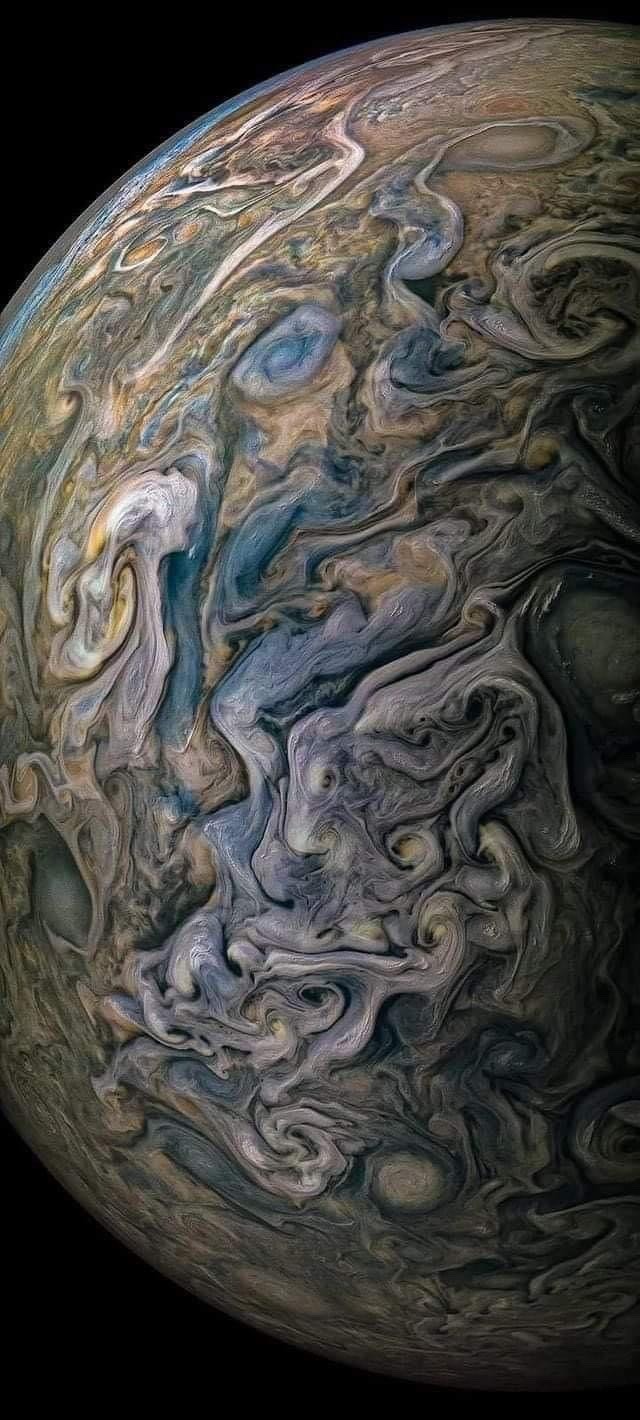NGC 6995: The Bat Nebula : Do You See The Bat? It Haunts This Cosmic Close-up Of The Eastern Veil Nebula.

NGC 6995: The Bat Nebula : Do you see the bat? It haunts this cosmic close-up of the eastern Veil Nebula. The Veil Nebula itself is a large supernova remnant, the expanding debris cloud from the death explosion of a massive star. While the Veil is roughly circular in shape and covers nearly 3 degrees on the sky toward the constellation of the Swan (Cygnus), NGC 6995, known informally as the Bat Nebula, spans only ½ degree, about the apparent size of the Moon. That translates to 12 light-years at the Veil’s estimated distance, a reassuring 1,400 light-years from planet Earth. In the composite of image data recorded through narrow band filters, emission from hydrogen atoms in the remnant is shown in red with strong emission from oxygen atoms shown in hues of blue. Of course, in the western part of the Veil lies another seasonal apparition: the Witch’s Broom Nebula. via NASA
More Posts from Of-finite-jurisdiction and Others
how I sleep at night knowing there are stars and planets and galaxies above my roof


Space Station Silhouette on the Moon : What’s that unusual spot on the Moon? It’s the International Space Station. Using precise timing, the Earth-orbiting space platform was photographed in front of a partially lit gibbous Moon last month. The featured composite, taken from Payson, Arizona, USA last month, was intricately composed by combining, in part, many 1/2000-second images from a video of the ISS crossing the Moon. A close inspection of this unusually crisp ISS silhouette will reveal the outlines of numerous solar panels and trusses. The bright crater Tycho is visible on the upper left, as well as comparatively rough, light colored terrain known as highlands, and relatively smooth, dark colored areas known as maria. On-line tools can tell you when the International Space Station will be visible from your area. via NASA
With NASA announcing their streaming service NASA+ and also announcing it’s going to be free and also ad free, I’d just like to appreciate the lengths they go to make scientific knowledge and exploration as available as they possibly can.





The Clearest Images of Jupiter ever taken
These beautifully real images are some of the closest images of Jupiter. Jupiter is the fifth planet from the Sun and the largest in the Solar System. It is a gas giant with a mass more than two and a half times that of all the other planets in the Solar System combined, but slightly less than one-thousandth the mass of the Sun. The original image was captured by JunoCam, the camera on NASA's Juno mission in orbit around Jupiter. This image was taken on Juno's 22nd close pass by Jupiter on Sept. 12, 2019 with image processing done by Prateek.
📸: NASA's Juno Space Probe / JunoCam
![Screenshot from nebula Wikipedia page: The "Pillars of Creation" from the Eagle Nebula. Evidence from the Spitzer Space Telescope suggests that the pillars may already have been destroyed by a supernova explosion, but the light showing us the destruction will not reach the Earth for another millennium.[1]](https://64.media.tumblr.com/b10fae13b89258a4bbd4b2cd7cf10646/939e648398194b92-95/s500x750/dd77cb9b6f24b0eaca6ca04b691a327c71641d09.jpg)
btw . insane little wikipedia caption for everyone’s consideration also




Rings of Gas Giants
l Uranus (Chandra) l Neptune, Jupiter (Webb) l Saturn (Cassini)



NASA’s Webb Space Telescope Reveals Astounding, Unprecedented Views of the Universe






Stephan’s Quintet/ Carina/ Southern Ring © JWST







-
 wonderingcheshirecat reblogged this · 5 months ago
wonderingcheshirecat reblogged this · 5 months ago -
 tumble-bug liked this · 6 months ago
tumble-bug liked this · 6 months ago -
 heraldfallen reblogged this · 11 months ago
heraldfallen reblogged this · 11 months ago -
 heraldfallen liked this · 11 months ago
heraldfallen liked this · 11 months ago -
 snek-amiga liked this · 1 year ago
snek-amiga liked this · 1 year ago -
 sidestreets reblogged this · 1 year ago
sidestreets reblogged this · 1 year ago -
 daedalaa liked this · 1 year ago
daedalaa liked this · 1 year ago -
 legolasghosty reblogged this · 1 year ago
legolasghosty reblogged this · 1 year ago -
 legolasghosty liked this · 1 year ago
legolasghosty liked this · 1 year ago -
 rainysaturdayafternoon reblogged this · 1 year ago
rainysaturdayafternoon reblogged this · 1 year ago -
 eepybubble reblogged this · 1 year ago
eepybubble reblogged this · 1 year ago -
 eepybubble liked this · 1 year ago
eepybubble liked this · 1 year ago -
 yesterdayorcenturiesbefore liked this · 1 year ago
yesterdayorcenturiesbefore liked this · 1 year ago -
 rainysaturdayafternoon liked this · 1 year ago
rainysaturdayafternoon liked this · 1 year ago -
 rainysaturdayafternoon reblogged this · 1 year ago
rainysaturdayafternoon reblogged this · 1 year ago -
 newtness532 reblogged this · 1 year ago
newtness532 reblogged this · 1 year ago -
 newtness532 liked this · 1 year ago
newtness532 liked this · 1 year ago -
 tethys-the-aquatic-sea-godness reblogged this · 1 year ago
tethys-the-aquatic-sea-godness reblogged this · 1 year ago -
 tethys-the-aquatic-sea-godness liked this · 1 year ago
tethys-the-aquatic-sea-godness liked this · 1 year ago -
 pasrighditheli liked this · 1 year ago
pasrighditheli liked this · 1 year ago -
 deepcap1001 liked this · 1 year ago
deepcap1001 liked this · 1 year ago -
 violetsaiyan liked this · 2 years ago
violetsaiyan liked this · 2 years ago

Finn OFJ’s space blog. Do you love space?? you better. or else
39 posts